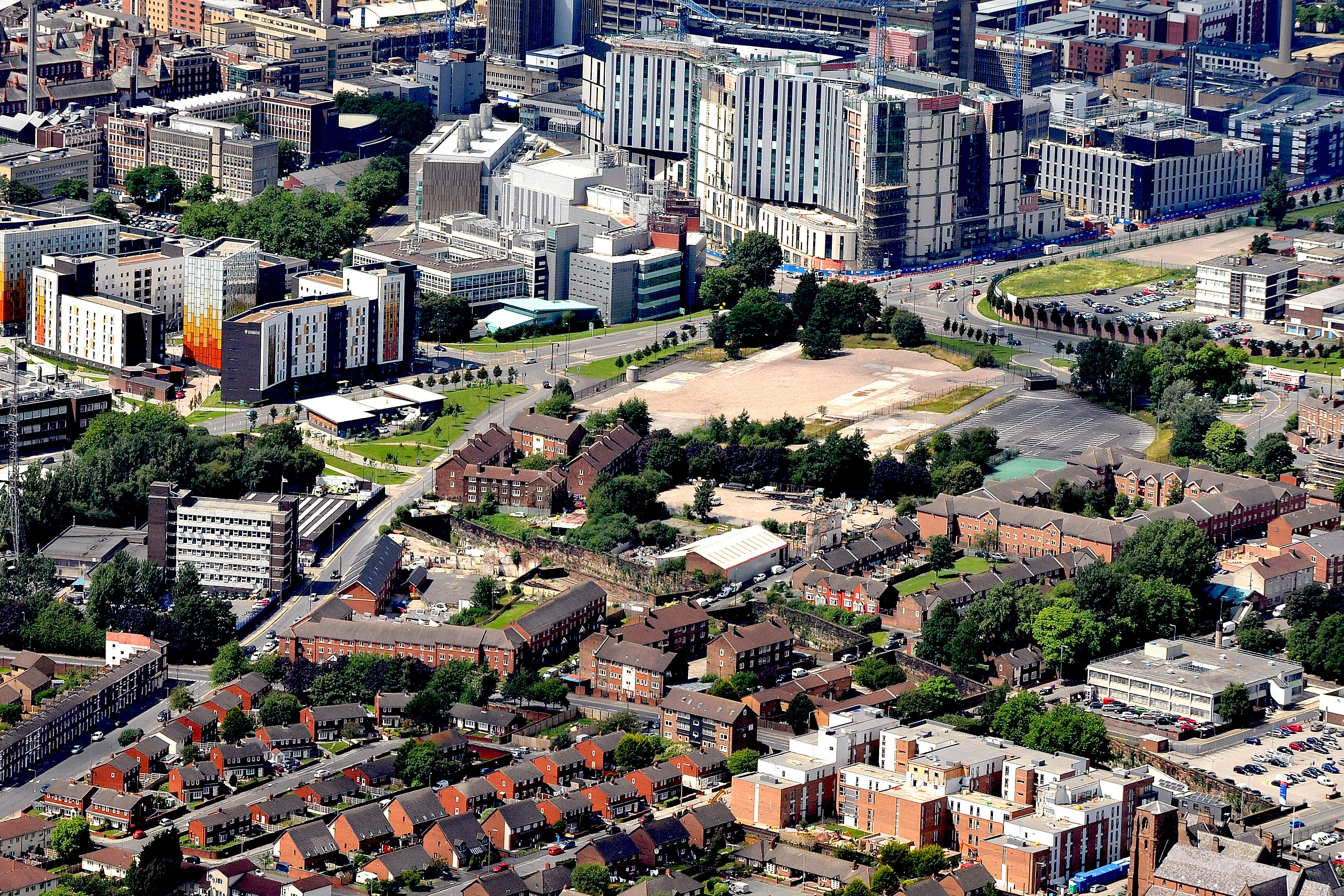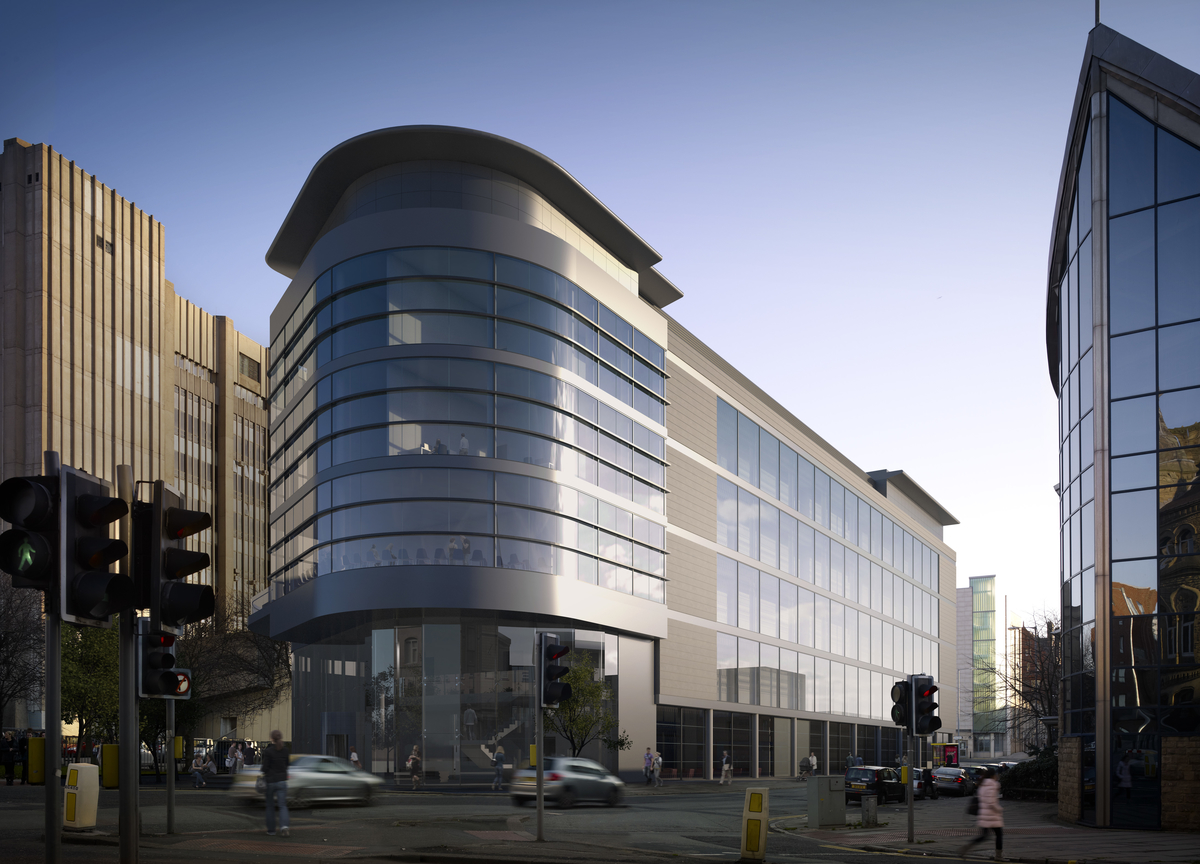
Liverpool’s leading politicians, universities and hospitals came together today to launch their multibillion pound vision for the redevelopment of a major part of the city centre.
The plans for the 450-acre Knowledge Quarter, which encompasses Liverpool John Moores University, the University of Liverpool, Liverpool School of Tropical Medicine and the new Royal Liverpool University Hospital, with the resultant Health Campus, will see it become a world-class destination for science, innovation, education, technology and the creative and performing arts.
Among the highlights of the £2bn, five-year plan is Paddington Village, a 1.8m sq ft health, education science and residential development space on the site of the former Archbishop Blanch school, and a brand new Knowledge Quarter Liverpool (KQ Liverpool) railway station, connected to Liverpool’s underground network.
Kaplan International this week announced joint plans with the University of Liverpool to develop Liverpool International College, a 45,000 sq ft education and learning facility with 260 residential bed spaces at Paddington Village, joining the Royal College Physicians’ new Northern Centre of Excellence as the first two anchor tenants at the 30-acre site.

These developments will complement a number of ongoing development projects in the Knowledge Quarter, such as the Clatterbridge Cancer Centre, Liverpool Life Sciences Accelerator, Materials Innovation Factory and Sensor City, which are currently being developed at a combined cost of £264m.
They may eventually be joined by a fourth innovation centre at Liverpool Science Park, a Centre of Excellence in Infectious Disease Research (CEIDR) and Materials Innovation Factory 2 – The Robotics Innovation Factory linked to the University of Liverpool Leverhulme Centre for Functional Materials Design.
A new KQ Liverpool investment fund is also planned, which would be made available to support life sciences and technology spin-outs and start-ups, particularly those arriving at Sensor City and the Liverpool Life Sciences Accelerator.
The announcements were made at the London headquarters of the Royal College of Physicians (RCP) to coincide with MIPIM UK, a major property and regeneration exhibition taking place in the city this week.
Professor Janet Beer, chair at KQ Liverpool, said: “For the North of England to keep pace, and eventually close the economic gap with London and the South East, we need to attract and retain the very best students, graduates, scientists, clinicians, academics and business innovators.
This plan sets out our partnership vision for KQ Liverpool and how we intend to establish one of the world’s leading innovation districts. A place of collaboration and discovery in science, technology, education, medicine and culture and a place where great discoveries are made."
The Knowledge Quarter is one of five Mayoral Development Zones in Liverpool, established as part of its ‘City Deal’ regional devolution agreement with central government.
Mayor of Liverpool, Joe Anderson, said: “With £1bn of investment already underway and a potential further £1bn at Paddington Village alone, these are really exciting times for Liverpool and the wider city region’s knowledge economy.
“Liverpool’s Knowledge Quarter is unique in the UK providing an unrivalled concentration of expertise in science, technology, health, education, music and the arts – all within a city centre location.
“When you also consider its natural wealth of cultural assets, such as Liverpool Philharmonic, the Everyman and Unity Theatres, not to mention two stunning cathedrals, the Knowledge Quarter offers a genuine sense of place and should be a clear first choice for organisations investing in the science, health and education sectors.”
Colin Sinclair, chief executive of KQ Liverpool, said: “We have a simple plan, which is to build on the existing academic, medical, scientific and cultural brilliance that already exists, to create a world-class innovation district at the heart of a great city region.
“We want this to be an attractive and innovative place where people will aspire to live and work and will never want to leave! Today’s announcement is another fundamental step towards that vision.”
END
Notes to editors
About Knowledge Quarter Liverpool (KQ Liverpool)
KQ Liverpool is a 450-acre urban innovation district and is home to some of the world’s most influential players in science, health, technology, education, music and the creative and performing arts.
With over £1bn of new developments currently underway – and a further £1bn in the pipeline – we plan to increase the city’s employment figures, improve graduate retention and attraction rates and establish Liverpool at the forefront of the Northern Powerhouse.
The unique mix of science, medicine and culture, combined with KQ Liverpool’s stunning architecture and its position at the heart of the city, has already attracted the Royal College of Physicians who have chosen KQ Liverpool as the home for their new Northern Centre of Excellence.
The KQ Liverpool team is tasked with defining, creating and promoting the place and occupies the dynamic space between ambition and delivery. We believe that the whole is greater than the sum of its parts, which is why we bring together the city’s key partners to collaborate in a creative environment, allowing us to not only discover and present opportunities but to respond to them quickly.
We provide consistent messaging, a single point of contact for investors and businesses and through the ‘power of place’ foster clustering, networking and knowledge transfer.
Founding KQ Liverpool board members
Liverpool City Council: Liverpool City Council is one of the largest local authorities in the UK. It provides a wide range of services including education, social care, leisure, parks maintenance and takes a lead role in the regeneration of the city. Over the next 15 years, the authority aims to deliver projects worth in excess of £10bn and build 30,000 new homes as the city’s population rises to 497,000 people.
Liverpool John Moores University: Founded in 1823, Liverpool John Moores University (LJMU) has a clear vision to be recognised as a modern civic university delivering solutions to the challenges of the 21st century. It is setting new standards in higher education, and recently became the first university to achieve two commended judgments in the 2016 review by the Quality Assurance Agency (QAA).
University of Liverpool: Founded in 1881 as the original ‘red brick’, the University of Liverpool (UoL) is one of the UK’s leading research institutions, with an annual turnover of £480 million, including £102 million for research. Ranked in the top 1% of higher education institutions worldwide, the UoL is a member of the prestigious Russell Group.
Liverpool School of Tropical Medicine: Liverpool School of Tropical Medicine (LSTM) is the world’s oldest centre of excellence in tropical medicine and international public health. It has been engaged in the fight against infectious, debilitating and disabling diseases since 1898 and continues that tradition today with a research portfolio of well over £210 million and a teaching programme attracting students from over 65 countries.
Royal Liverpool and Broadgreen University Hospitals NHS Trust: The Royal Liverpool and Broadgreen University Hospitals NHS Trust (RLBUHT) is one of the largest and busiest hospital trusts in the North of England with an annual budget of over £400 million, with 5,600 directly contracted staff and over 650 staff in the hosted services or contracted services such as catering. It provides services across two sites, which contains three hospitals: The Royal Liverpool University Hospital, Broadgreen Hospital and Liverpool University Dental Hospital.
Visit Hope Street Community Interest Company (CIC): The Visit Hope Street Community Interest Company (CIC), was established in 2009 and comprises of some of the key businesses and organisations in and around Hope Street. The mission of the group is to promote Hope Street as a great visitor destination in Liverpool. The group is an eclectic mix of businesses, cathedrals, cultural and educational institutions, united in their passion for Hope Street and working together to develop its future.
Liverpool Vision: Liverpool Vision is the city’s economic development company and works within the strategic leadership of the Mayor of Liverpool. The company has three functions; Invest Liverpool, Marketing Liverpool and International Festival for Business. Liverpool Vision aims to fuse economic development and business and enterprise support to accelerate the city’s growth and build a sustainable economy.
